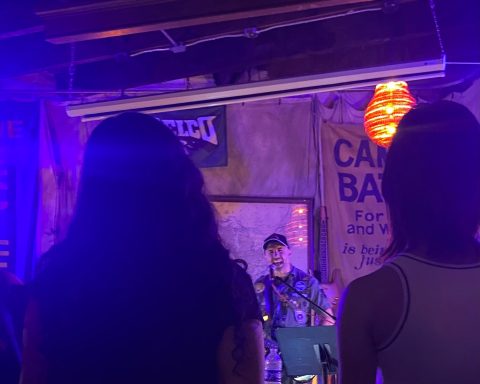Editor’s note: This article was initially published in The Daily Gazette, Swarthmore’s online, daily newspaper founded in Fall 1996. As of Fall 2018, the DG has merged with The Phoenix. See the about page to read more about the DG.

“What is it like to do the same thing over and over again and not succeed?” asked Susannah Sheffer ’86 in her lecture in the lang Center Keith Room on Friday September 27. During her talk, Sheffer spoke about and read excerpts from her new book Fighting for Their Lives: Inside the Experiences of Capital Defense Attorneys.
For her new book, Sheffer interviewed twenty capital defense attorneys, all of whom had lost at least one client to the death penalty – some had even lost as many as ten or twenty clients. The book seeks to explore the uncharted emotional impact of capital punishment on capital defense attorneys i.e the lawyers who defend clients who have been sentenced to death. To Sheffer, the psychological burdens that come with the Sisyphean task of defending clients in their last days are particularly compelling.
“What is interesting is that [these attorneys] mostly lose, and they keep doing it,” said Sheffer, describing the persistence of the attorneys regarding their seemingly hopeless work.
This is not Sheffer’s first time dealing with groups of people impacted by the death penalty. In her work as Project Director and staff writer for Murder Victims’ Families for Human Rights, Sheffer has worked with families of both murder victims and executed prisoners to lobby against capital punishment. However, capital defense attorneys, with their constant exposure to the systemic and human problems surrounding the death penalty, have a unique perspective on this highly complicated and emotional issue.
Most notably, Sheffer spoke of the guilt and sense of helplessness these attorneys encounter while defending their clients, particularly during the “end stage” when clients have already been sentenced to death. According to Sheffer, attorney after attorney analogized their experience to the same image. “They said that it’s like watching someone tied to the train tracks as the train is approaching, and you’re trying to stop the train,” she said. “It’s especially difficult when the train has already left the station.” Indeed, when the judgment to execute a criminal has already been passed, the accused’s death becomes all the more inevitable, no matter the quality of defense the attorney has to offer. And even though he or she “intellectually knows it was not [his or her] fault,” the attorney is still emotionally burdened with his or her client’s death.
“’You know intellectually that [the execution] wasn’t your fault, but your job was to save his life and you didn’t do it,’” was a striking quote from one of the attorneys Sheffer interviewed. She also recalled another attorney who went into the interview denying any feelings of guilt, but over the course of their conversation realized that he felt his client’s death was his fault.
The futility of their efforts drastically changes these attorneys’ outlooks on their careers, especially when most of them matriculated from prestigious law schools and have been very accomplished for most of their lives. Often they struggle to “make sense of this lack of correlation between skill and success,” said Sheffer. Overtime, an attorney’s focus shifts from “success,” to the “value, rightness, [and] truth” of their work, and then finally to their clients themselves. As one interviewee put it, “You struggle less and less for an idea, and more for specific people.”
Sheffer also focused heavily on the attorneys’ personal investment in their clients’ wellbeing. Even though many of their clients are guilty of horrific crimes, the attorneys come to know them on a very human level as they work with them more and more. Because establishing a healthy relationship with the client is highly important, many attorneys unexpectedly come to like some of their clients as people after speaking to them. The defense attorney’s role is so crucial, that he or she is often the last person the client speaks to before being executed. In these last moments, the attorney must try to “not be inadequate.”
Sheffer read from her book one account of an attorney’s last meeting with his client, in which the attorney recalled struggling to provide emotional support while grappling with his own feelings of grief.
Sheffer closed with a commentary on the defense attorneys’ heightened appreciation of the ordinary pleasures of life. “It all just makes me want to go home and play with my kids,” said one attorney to Sheffer, when describing the stress that came from their work. Ultimately, self-care and seeking solace in the ordinary world is how this distinct group endures the burdens of its work day after day.
In her hour-long lecture, Sheffer revealed a complicated and conflicted detail of the already controversial picture of capital punishment. While she did not offer any grand solutions to the occupational hazards of capital defense or the death penalty, Sheffer managed to provoke the audience to ponder the full emotional impact of this part of our society.













